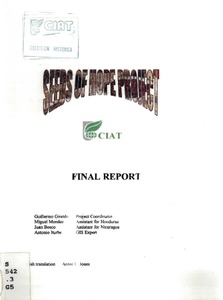Seeds of hope project
During the week beginning the 25th of October 1999 in Honduras and Nicaragua, Hurricane Mitch devastated large areas in the cities, razed bridges and highways, and left some regions isolated, blocking aid efforts. The production of basic grains that are obtained in the hillsides, where the poorest farrners live, suffered serious damage. Winds and floodwaters badly hit the productive areas where some farmers were harvesting their crops and others were planting. Great losses were caused, affecting the economy and production of food of these two countries. Facing this situation, four CGIAR centers, CIAT, CIMMYT, CIP, and IPGRI proposed and supported an emergency Project called "Seeds of Hope". This united efforts with government organizations (GOs) in Honduras such as the Office of Agricultural Science and Technology Research (DICTA) and the Ministry of Agriculture (MAG) and the Nicaraguan Institute of Agricultural Technology (INTA) In both countries it also involved some NGOs and Committees for Local Agricultural Research (CIALs).During the week beginning the 25th of October 1999 in Honduras and Nicaragua, Hurricane Mitch devastated large areas in the cities, razed bridges and highways, and left some regions isolated, blocking aid efforts. The production of basic grains that are obtained in the hillsides, where the poorest farrners live, suffered serious damage. Winds and floodwaters badly hit the productive areas where some farmers were harvesting their crops and others were planting. Great losses were caused, affecting the economy and production of food of these two countries. Facing this situation, four CGIAR centers, CIAT, CIMMYT, CIP, and IPGRI proposed and supported an emergency Project called "Seeds of Hope". This united efforts with government organizations (GOs) in Honduras such as the Office of Agricultural Science and Technology Research (DICTA) and the Ministry of Agriculture (MAG) and the Nicaraguan Institute of Agricultural Technology (INTA) In both countries it also involved some NGOs and Committees for Local Agricultural Research (CIALs).

